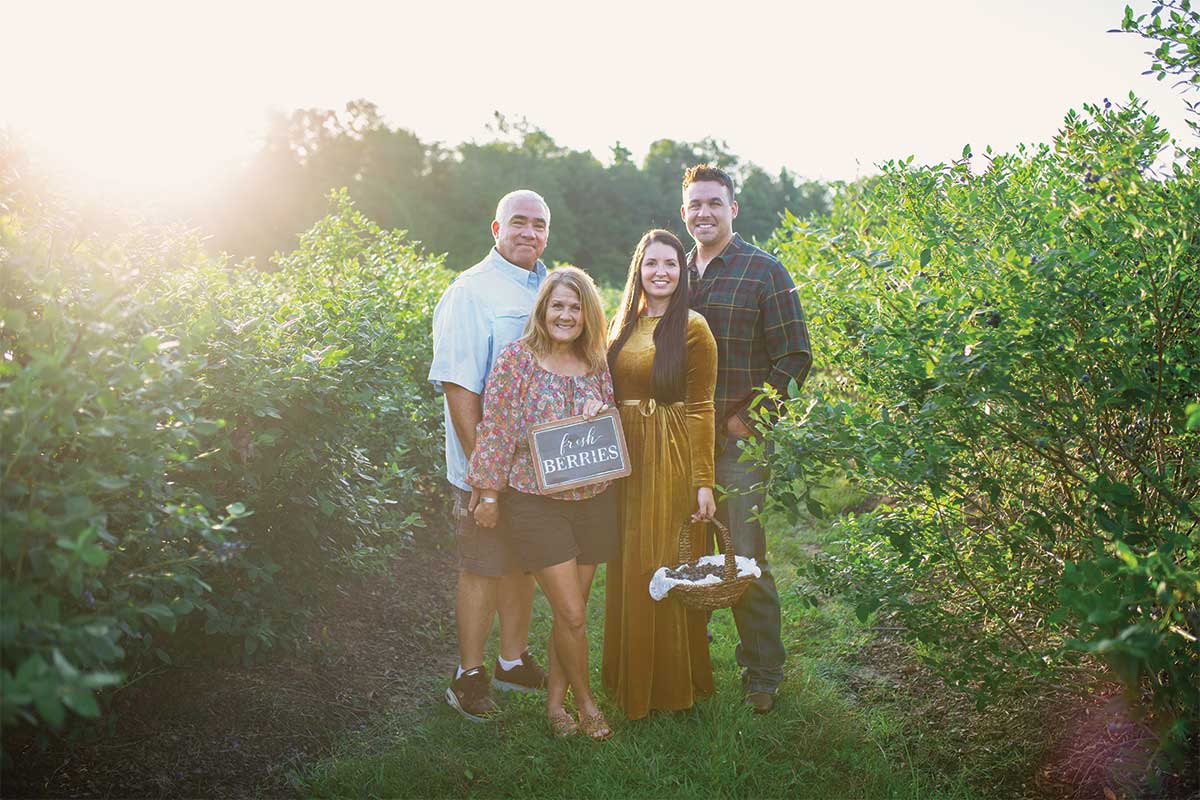The roots of blueberry bushes near Honey Island and Kountze are anchored in East Texas dirt, which provides purchase and purpose for the farmers who nurture the bushes and harvest their fruit.
“I retired in 2008, and I wanted to be a farmer,” said Jerry Gates, owner of J&J Blueberry Farms and a Sam Houston Electric Cooperative consumer-member. “I do love it here in East Texas, and don’t you doubt it.”
Gates and his son, Luke, and several other farmers are members of the Texas Blueberry Marketing Association, a cooperative headquartered in Fred. The father and son bought their farm from Don Duhon in 2006 after they were the first ones to give Duhon a deposit.
“He was a man of his word,” Gates said. “Don said the first man who put down a thousand dollars, [the land] was his. I made a phone call, and within 20 minutes I was approved, so I bought the farm.”
Shortly after purchasing the property, Gates noticed Duhon was preparing to move from the land he had sold. Gates had tremendous respect for Duhon and invited the previous owner to stay at the farm as long as he wanted. Duhon took him up on the offer and stayed on the property for several years before eventually moving to Houston.
Gates was new to farming but not to East Texas or blueberry farms. His father and brother owned a blueberry farm while Gates was a welder in the oil and gas industry. Gates did not work “the patches,” as he calls them, but he did help process the blueberries before they left the farm.
Cooperatives, no matter the industry in which they exist, abide by seven core principles. Education and Training is one of those principles, and it informs the dealings of the farmers of the Texas Blueberry Marketing Association.
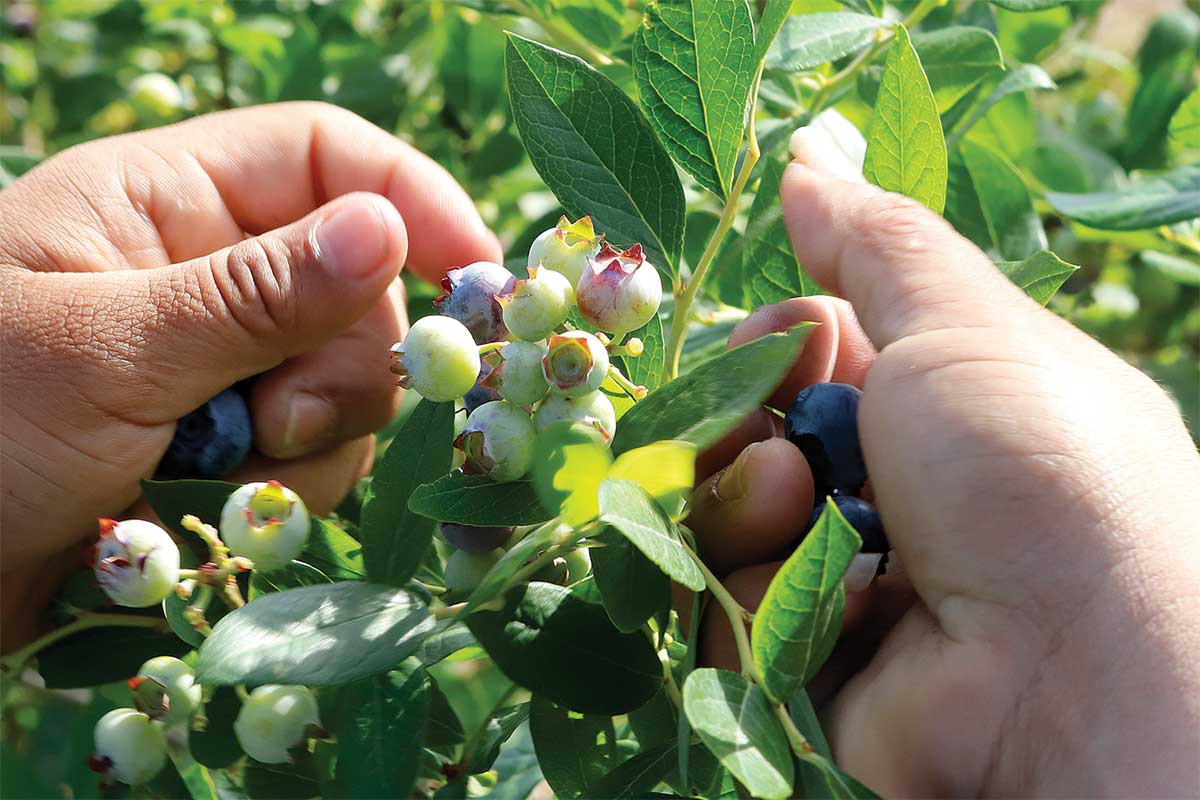
Blueberries are picked from Jerry Gates’ farm. Workers make up to five passes throughout the farm to pick the berries at their ripest.
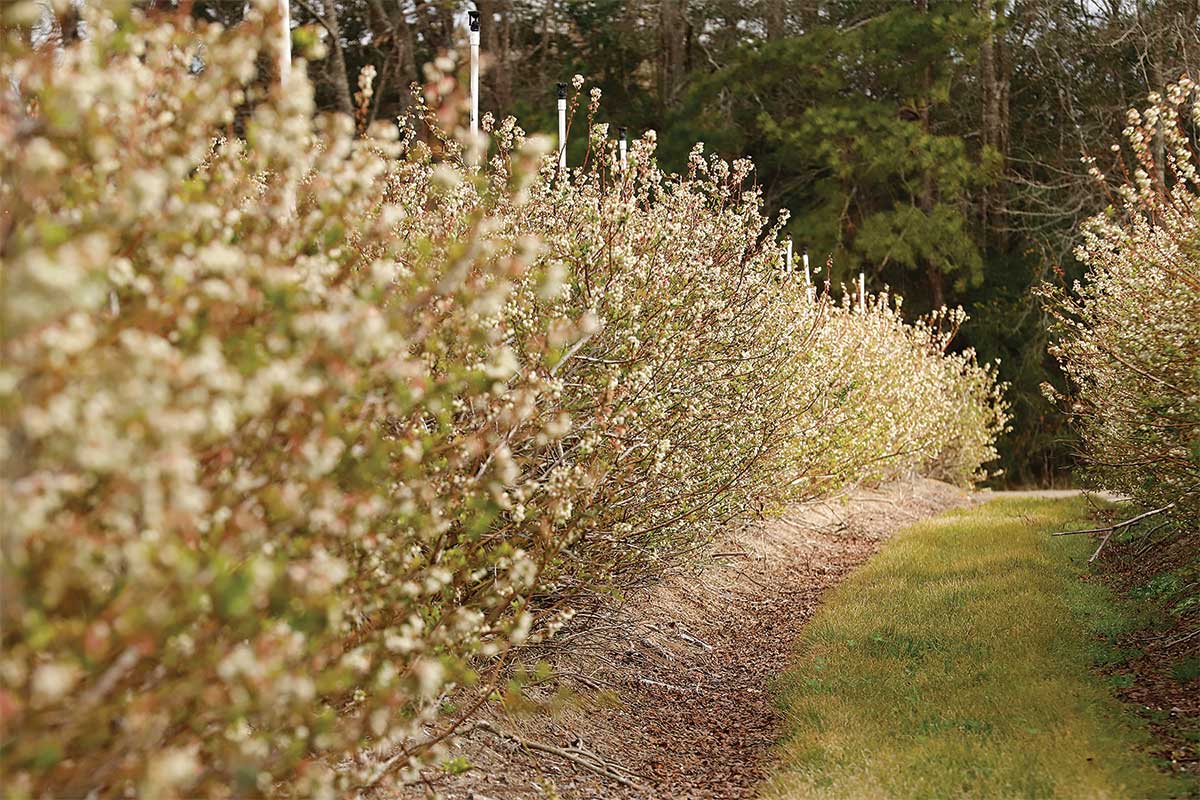
Blueberry bushes are neatly planted in rows to allow for better care and to make harvesting easier.
Gates and the owners of nearby KJ Farms share information and equipment to help each other thrive. The two farms are located just a few miles from each other in Hardin County.
“Kevin [Johnson] reads; I am not a reader,” Gates said. “He passes information on to me. It is all about helping each other.”
In return, Gates stores Johnson’s blueberries in his large cooler until a truck comes to pick them up. The blueberries don’t stay in the cooler for long, though. They are usually on store shelves within a couple of days of harvesting, according to Stacey Johnson, Kevin’s wife.
KJ Farms is also owned by a father and son, Kevin and Kyle Johnson. Kyle worked for Wayne Partlow, owner of Blueberry Basket Farm, while he was in high school. Meanwhile, Kevin was a teacher, coach and athletic director at Lumberton High School.
Stacey, Kyle’s mother, is a retired teacher from the Lumberton Independent School District, where she taught for nearly 30 years until 2014. While Stacey is not listed as an owner of KJ Farms, she cares for the blueberry bushes and works the farm as much as her son and husband, although that was not their initial plan.
When Kyle was in high school, he suggested that the family start a blueberry farm. His father, not wanting to discourage him, told Kyle that if he came up with a business plan, he would entertain the possibility.
“We were surprised he did all that work,” Stacey said. “We went behind him to check the numbers, and they were correct. We sat down with him and said if this is really what you want to do, we will finance it and you put in the labor.”
Kyle cleared land on the family’s property and installed the water lines, then they planted thousands of blueberry bushes. It seemed as if the farm was off to a good start, even though it would take several years for the bushes to produce a meaningful quantity of berries.
Then Kyle surprised his parents yet again and enlisted in the U.S. Army to become an Army Ranger.
“I needed to mature, and the Army allowed me to do that,” Kyle said.
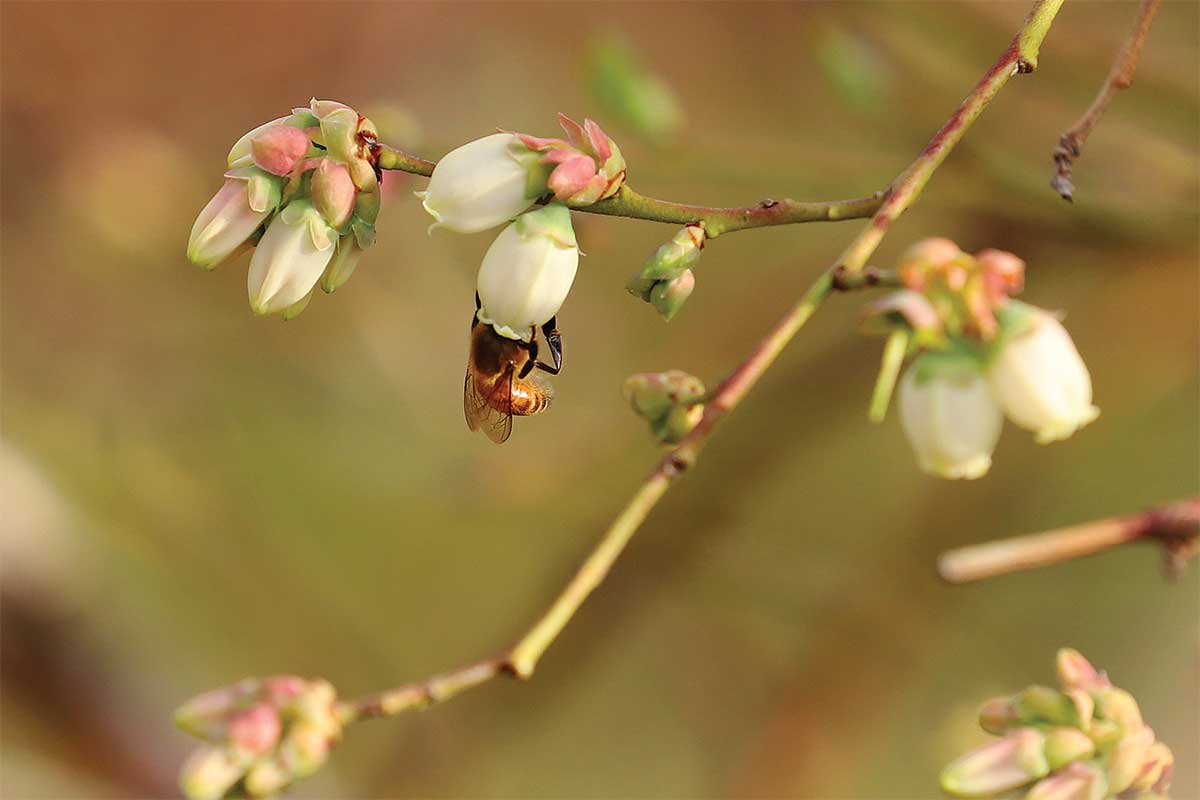
Bees from Minnesota are transported to blueberry farms to pollinate blueberry bushes during late winter and early spring.
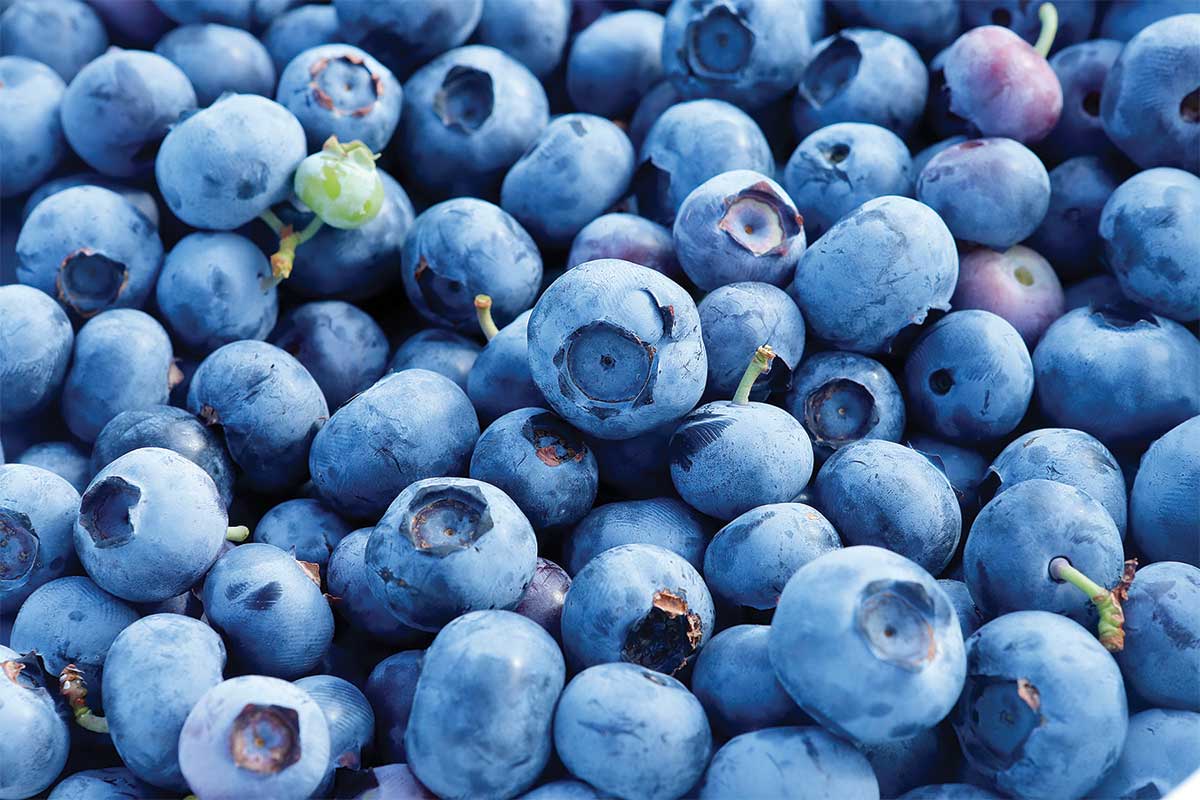
Blueberries are picked throughout the day and packed in the evening. The berries can be in local stores as little as 24–48 hours after harvesting.
As Kyle defended the nation for more than a decade, Kevin and Stacey learned what it took to be blueberry farmers, even while Stacey still taught for several years.
“We had them planted in December, then he joined the Army and left,” Stacey said. “He initially signed up for four years, then we get a video of him during a deployment with him in a helicopter as he was [reenlisting], so he spent 11 years in the military before returning.”
When Kyle returned to the area, he brought reinforcements in the form of Samantha, his wife.
Kyle and Kevin want to see their farm grow. They made their pond larger and added several more acres of bushes recently. The pond will provide water for the overhead irrigation system that protects the berries from overnight freezes early in the growing season.
“We watch the weather real close, and if we know it will freeze at night, we turn the overhead on,” Gates said. “When it freezes, the water makes a blanket on the blooms. That is good, if it thaws out during the day.”
Blueberry farming, like any other farming, is not for the faint of heart. In addition to the hard work during harvest season, there’s a lot of work that needs to be done to prepare for the next season. Bushes needed to be pruned, since only new growth will produce berries. Mulch needs to be applied. Bushes may need to be removed and replaced periodically. And the blueberry farmers of East Texas desperately hope winter storms and hurricanes avoid the area.
The February 2021 winter storm brought bitterly cold weather to East Texas that had not been felt in the region in decades. Temperatures did not rise above freezing for five days, and the extreme conditions rendered the overhead watering systems useless.
“2021 was the worst year I ever had,” Gates said. “The plastic water pipes busted. Everything went to heck in a handbasket, and our insurance didn’t cover it. All that was wasted.”
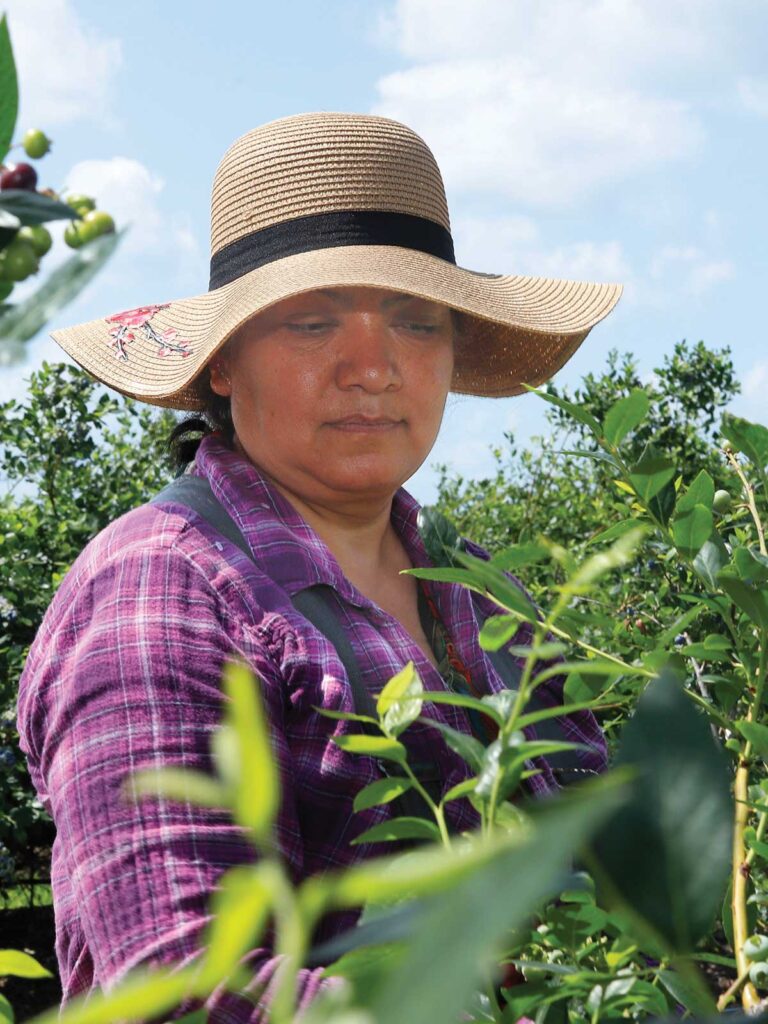
A worker picks berries from the bushes at KJ Farms.
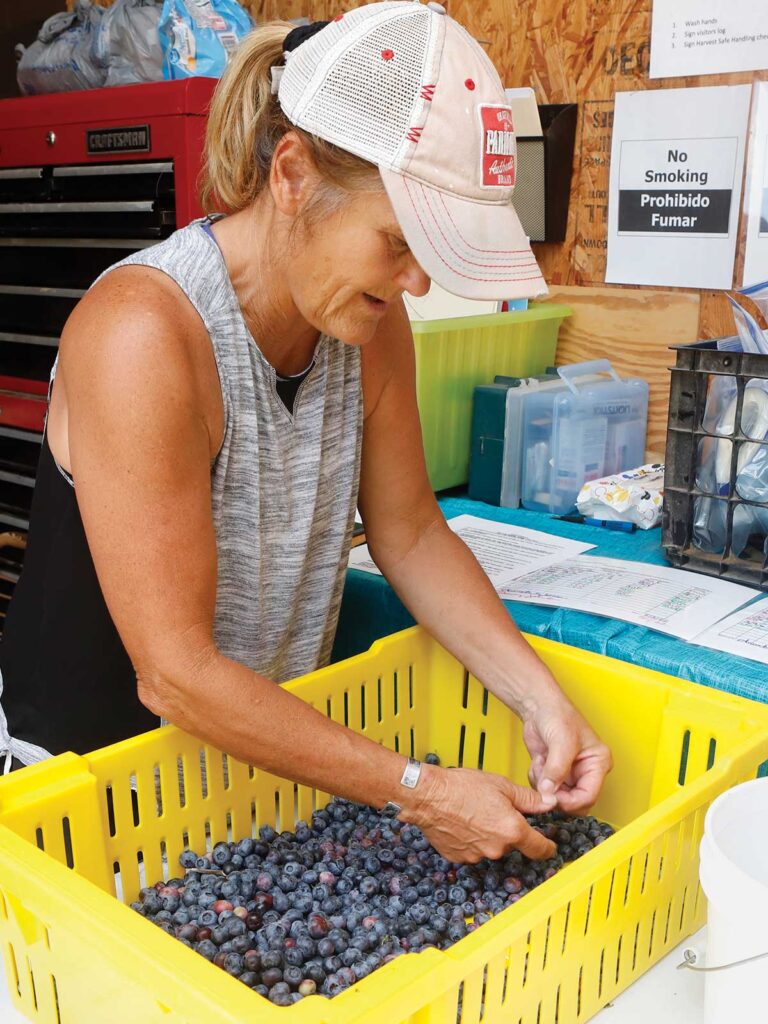
Stacey Johnson of KJ Farms processes blueberries after they have been picked and brought in from the field.
Down the road at KJ Farms, the situation was just as dire.
“We could hear the plants cracking under the weight of the ice,” Stacey said. “My son said he had never heard me sob like that. When they break off at the crown, there is no repairing that.”
Through hardships, blueberry farmers persevere. Following the harsh 2021 winter, blueberry farmers bounced back with good yields in 2022. There is hope that this summer’s crop will be bountiful too.
Gates takes great pride in the production and the appearance of his farm for motorists who drive past on FM 1293. The inspiration for his farm is the memory he has of his father’s blueberry farm.
“When his was up and going, it was the most beautiful thing,” Gates said. “I try to compete against what my dad’s farm looked like. To me, his farm was the standard. I am trying to make my daddy proud with my farm. I love it, and I wouldn’t sell it for anything.”
As Gates tries to live up to his father’s legacy, he also hopes to inspire his grandchildren. He hopes they will catch the farming bug before he did and keep up the tradition of blueberry farming in East Texas.
“My dream is to give my part to the grandkids,” Gates said. “I would love for my granddaughter to do this when she gets older.”
Small, local East Texas blueberry farms are not on the scale of bigger operations in Georgia or Florida, according to Gates, but additional patches will push the farms from hobby farming to the commercial farming stage.
Until that happens, Gates will continue to rely on his fellow local farmers at the Texas Blueberry Marketing Association for help, and he will assist others as he is able. The association’s farmers embody the cooperative difference by working together to improve lives, serve their community and help one another.
“This is just a home business,” Stacey said. “We are in it together, and we are trying to put out the best product possible. We hope to provide something that is good for the community.”
